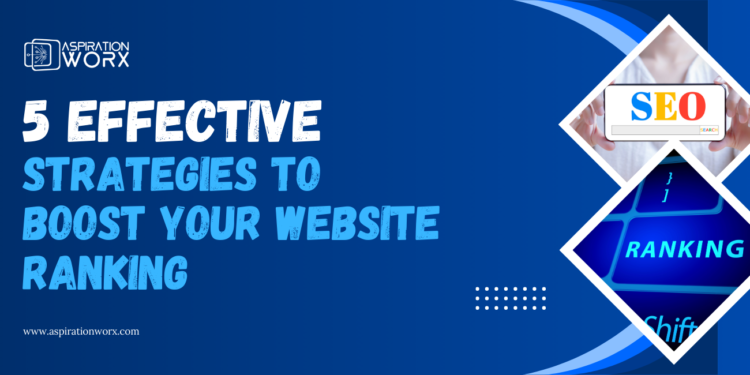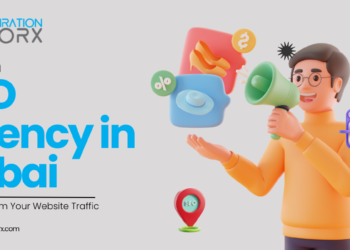5 Effective Strategies to Boost Your Website Ranking
In the competitive world of digital marketing, achieving a high search engine ranking is crucial for driving organic traffic to your website. Search engines like Google consider several factors when ranking websites, and optimizing your site to meet these criteria can significantly improve your visibility. Here are five effective strategies to enhance your website’s ranking and ensure it stands out in the crowded online space.
1. Optimize Your Website for Mobile Devices
With the increasing number of users accessing websites via smartphones and tablets, mobile optimization has become essential. Google’s mobile-first indexing means that the mobile version of your site is now the primary version used for ranking. To ensure your website is mobile-friendly, use responsive design, optimize images, and streamline navigation. A mobile-optimized site not only improves user experience but also boosts your chances of ranking higher in search results.
Mobile-Friendly Design Elements
- Responsive Design: Implement a responsive design that adapts to different screen sizes. This ensures that your website looks great on both desktop and mobile devices.
- Optimized Images: Compress images to reduce load time without compromising quality. Fast-loading pages improve user experience and SEO rankings.
- Easy Navigation: Simplify your website’s navigation by using a clear and concise menu structure. Users should be able to find what they need quickly and easily.
2. Focus on High-Quality Content
Content remains king in the realm of SEO. High-quality, informative, and engaging content not only attracts visitors but also encourages them to stay on your site longer, reducing bounce rates. To create content that ranks well, focus on the following:
Content Creation Tips
- Targeted Keywords: Conduct thorough keyword research to identify the terms your audience is searching for. Incorporate these keywords naturally into your content to improve relevance and ranking.
- Original Content: Avoid duplicate content and strive to offer unique insights that set your website apart from competitors. Search engines reward originality and penalize duplication.
- Engaging Formats: Utilize various content formats, such as blogs, videos, infographics, and podcasts, to cater to different audience preferences. Diverse content types can keep users engaged and improve your site’s overall SEO performance.
3. Improve Website Loading Speed
Page speed is a critical factor in both user experience and search engine ranking. Slow-loading pages frustrate users and lead to higher bounce rates, which can negatively impact your rankings. Here’s how to speed up your website:
Speed Optimization Techniques
- Minimize HTTP Requests: Reduce the number of elements on your page, such as scripts, images, and CSS, to decrease load time.
- Enable Browser Caching: Use browser caching to store static files, allowing returning visitors to load your website faster.
- Optimize Code: Clean up your HTML, CSS, and JavaScript to remove unnecessary code and improve load times.
4. Build a Strong Backlink Profile
Backlinks are a major ranking factor for search engines. A strong backlink profile indicates that your website is credible and authoritative. However, not all backlinks are created equal. Focus on acquiring high-quality backlinks from reputable sources.
Strategies for Earning Quality Backlinks
- Guest Blogging: Write guest posts for reputable websites in your industry. This not only builds your backlink profile but also exposes your content to a wider audience.
- Collaborate with Influencers: Partner with industry influencers to create content or participate in interviews. Their endorsement can lead to valuable backlinks from authoritative sites.
- Create Link-Worthy Content: Develop content that others want to link to, such as in-depth guides, original research, and case studies. High-quality content naturally attracts backlinks.
5. Optimize On-Page SEO Elements
On-page SEO involves optimizing individual pages on your website to rank higher and earn more relevant traffic. By paying attention to the following on-page elements, you can improve your site’s SEO performance:
Key On-Page SEO Factors
- Title Tags and Meta Descriptions: Craft compelling and keyword-rich title tags and meta descriptions that accurately describe your content. These elements are often the first thing users see in search results, so make them count.
- Header Tags (H1, H2, H3): Use header tags to structure your content and make it easier for search engines to understand. Incorporate keywords into your headers to boost relevance.
- Internal Linking: Link to other relevant pages on your website to improve navigation and distribute link equity. Internal links help search engines discover and index your content more efficiently.
Conclusion
Improving your website’s ranking is an ongoing process that requires consistent effort and attention to detail. By optimizing for mobile devices, focusing on high-quality content, improving loading speed, building a strong backlink profile, and refining on-page SEO elements, you can significantly enhance your website’s visibility and attract more organic traffic. Implement these strategies to stay ahead of the competition and ensure your website ranks at the top of search engine results.
















